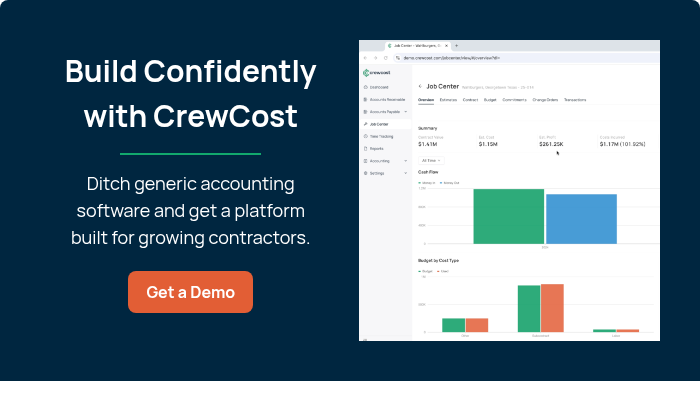Capitalizing costs during construction projects describes recording certain purchases as assets versus expenses. The guiding convention behind cost capitalization is that the value of the purchase remains, despite the outlay of cash or assumption of debt required for the acquisition. Recording the purchase as an asset on the balance sheet as opposed to an expense on the income statement indicates that the company considers the purchase to be of long-term value to its business.
Cost capitalization also allows the company to record significant expenses over a period of time versus taking a large lump sum hit on its profit and loss statement. Though such capitalized expenses still appear on the company’s financial statements, they do so over time rather than all at once.
A construction company typically decides to capitalize a purchase if it expects continuing value from that acquisition. Capital expenditures must be used for creating revenue, and companies must expect to use such purchases across multiple projects or reporting periods. Company costs and consumables that don’t meet these criteria are generally expensed on the P&L.
Types of Costs Eligible for Capitalization
What costs are capitalized during construction can vary. Among the typical costs associated with new construction that are eligible for capitalization are materials used in the construction of a particular asset, sales tax and interest related to an asset purchase, fully burdened labor tied directly to the construction of certain assets, and any transportation costs associated with purchase and acquisition of assets.
Capitalization Guidelines and Criteria
Successful construction companies understand the importance of developing and implementing sound policies for governing the capitalization of costs. Any protocols a company establishes for its capitalization policies must also adhere to IRS and Financial Accounting Standards Board (FAB) rules and regulations.
It’s critical to be certain these practices are created and implemented consistently to ensure accurate bookkeeping and tax reporting. Most businesses lean heavily on the expertise of the company’s CPA for guidance on their capitalization policies and procedures.
Documentation and Record-Keeping
It’s important for construction companies to maintain proper documentation to support any decisions related to cost capitalization. As with all elements of construction accounting, solid record-keeping practices are essential. Many contractors have found that the accuracy and efficiency of their record-keeping and documentation efforts are greatly improved through the use of specialized construction accounting software.
Depreciation and Amortization
Depreciation and amortization are key concepts in cost capitalization. Capitalized costs are amortized or depreciated over time rather than being expensed in a single-entry lump sum. This is generally done to better align an asset’s cost with its overall value.
If a purchase is capitalized, it is expensed over time via amortization for intangible assets or depreciation for tangible assets. Because capitalized expenses are typically amortized or depreciated over multiple reporting periods or projects, the effect of capitalizing a purchase on a company’s P&L continues into the future.
Compliance with Accounting Standards
Accounting standards and regulations governing cost capitalization in construction follow Generally Accepted Accounting Principles (GAAP) in the United States and International Financial Reporting Standards (IFRS) throughout most of the rest of the world. These criteria provide direction with regard to documenting the acquisition of capital assets as well as the management of their ongoing costs.
GAAP and IFRS guidelines address such matters as the time frame for an asset’s value or useful life, as well as costs associated with bringing that asset’s value to fruition. For example, GAAP allows the capitalization of things like transportation costs, shipping insurance, and set-up expenses related to realizing the long-term value of the asset.
Under GAAP, a contractor may capitalize certain improvements to property or equipment that extend the life or increase the value of the asset, given such spending isn’t otherwise considered to be associated with normal maintenance.
GAAP also allows for the capitalization of interest expenses tied to any financing a company uses for asset construction.
🔎 Dive Deeper: The Ultimate Guide to Construction Accounting for Contractors
Key Takeaways
The capitalization of construction costs is an important part of a contractor’s decision-making. It’s vital to understand the different types of costs eligible for capitalization and to know how depreciation and amortization affect a company’s P&L. Contractors must also recognize the importance of proper documentation, good record-keeping, and compliance with GAAP and IFRS standards.
Among the best ways construction contractors can ensure proper cost capitalization is to take advantage of the robust accounting and cost-tracking functionality found in software like CrewCost.
Having CrewCost in their toolbox allows contractors to easily connect the job site with their company’s back office, automating and streamlining accounting processes like online bank integrations, invoicing and billing, change order management, and more. With its cloud-based platform, CrewCost also provides powerful real-time reporting with project dashboards that deliver the instant insight contractors need to improve decision-making, ensure project success, and maximize their profitability.
Skip the generic software and use the platform built by contractors for contractors. Schedule a demo today and see how CrewCost solves the headache of construction accounting.
Related Posts:

